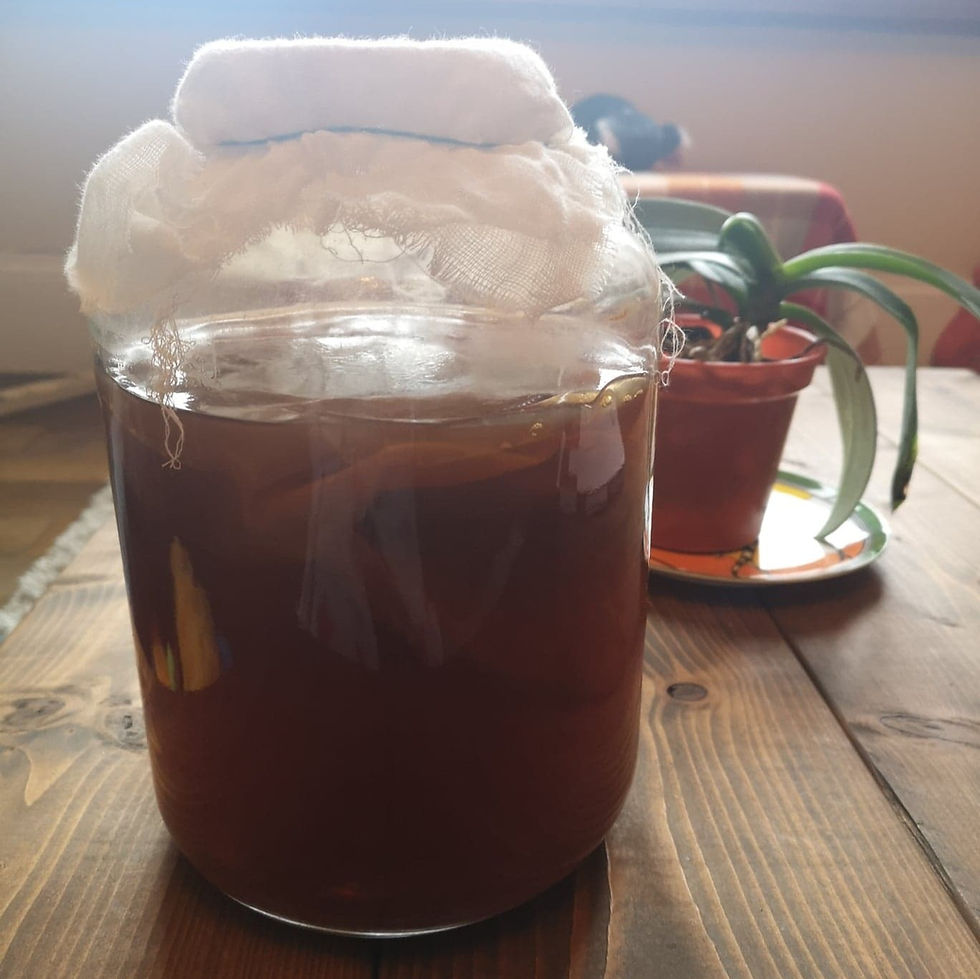How to understand the science of fermented foods and our guts - part #2
- Madi
- Feb 28, 2020
- 3 min read
Updated: May 24, 2022

We've already taken a brief walk through the important things to look for in a good research paper in part #1 of this blog series. So let's get to the juicy bit now - what does this latest review have to say on fermented foods and gut health?
In part #2 we'll be looking at the vegetable ferments that we specialise in (not that we're biased or anything) and a couple of well-known fermented drinks (komboucha and kefir).
Let's gut to the good stuff
· Fermented cabbage or ‘sour cabbage’ has been shown to contain some Lactobacillus strains which show probiotic potential (i.e. they can cope with acidic conditions, they can stick to cells lining the gut and show antimicrobial effects (in lab studies)).
· There have been a few human studies using sauerkraut including one which found a reduction in Irritable Bowel Syndrome (IBS)-severity scoring system after 6 weeks of consuming 75g/day of both non- and pasteurised sauerkraut. This shows that any benefit may not be due to actually consuming living microbes.
· Taking a balanced view high intake of sauerkraut has been associated with greater risk of laryngeal cancer. This is thought to be potentially due to the salt content, however association doesn’t mean causation so there might be other variables at play. In terms of blood pressure current thinking is that the salt in kraut is countered by potassium (found in veggies), which acts to lower blood pressure.
· Kimchi is the name given to a diverse range of fermented vegetable/salt vegetable products that can contain cabbage, other veggies and flavourings like chillies, shrimp paste or sesame seeds.
· Various effects have been found in the lab and in animal studies but it’s hard to know whether the effects come from the nutrients in the ingredients (particularly in chillies/garlic etc) or from the live microbes.
· In humans one tiny study found increased poop concentration of Lactobacillus and Leuconostoc but these participants were eating a massive 600g kimchi a day (even we don’t eat that much!). Other studies have found changes in gut microbiota composition after eating kimchi, including an increase in short-chain fatty acid (SCFA) producers. SCFAs are beneficial metabolites from certain microbial metabolism, having a range of good effects in our bodies.
KOMBOUCHA

· Komboucha is made by fermenting sweet black or green tea with a SCOBY (symbiotic culture of bacteria and yeasts), similar to kefir grains, but also totally different looking. What’s actually in a SCOBY can vary hugely so it’s hard to generalise claims about one batch of komboucha to komboucha as a whole (as it goes the same can be said for nearly all wild fermented products!).
· Although in animals komboucha has been found to have some beneficial effects on blood glucose control and elevated cholesterol levels, in regards to human gut health there have been no published RCTs.
· This means that most of the supposed benefits that come from drinking komboucha regularly are anecdotal, which is the lowest of the low in terms of quality of evidence. Doesn’t mean people aren’t on to something we just don’t have great supporting evidence – yet.
KEFIR
· Fermenting milk with kefir grains (a complex ecosystem of yeasts, bacteria and kefiran - a carbohydrate and protein matrix) reduces the lactose content of raw milk by 30%(ish) but seems to be as well tolerated by those with lactose intolerance as yoghurt.
· There’s all kind of cool effects we can see with kefir in lab (in vitro) studies such as antimicrobial, anticarcinogenic (cancer reducing) and cholesterol lowering effects.
· In animals this gets even cooler. Kefir can help reduce constipation by increasing poop weight and moisture and also increase amounts of ‘good bacteria’ in the gut microbiota.
· BUT, what about in humans? Again in one study an increase in stool Lactobacillus was found and also a potential benefit in improving constipation. However, these results came from small studies that had poor methodology. There’s also some improvement found from taking kefir alongside antibiotics for Helicobacter pyloriinfection; resulting in reduced diarrhoea, abdominal pain and nausea.
In part #3 we'll be looking at the evidence for sourdough bread and some delicious soya-based ferments you might not have heard of. So be sure to check it out!




